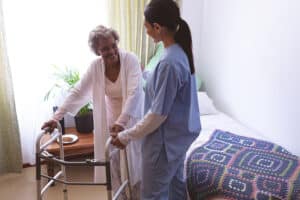Seniors have a higher risk than other age groups of being diagnosed with ALS. According to research, most people who get ALS are diagnosed between the ages of 50-70. As people get older the risk of being diagnosed with a serious illness like ALS increases, especially for men. Men are 20% more likely to be diagnosed with ALS than women. If your loved one has elder care services, they might be aware of the symptoms listed here as they develop.
ALS is a progressive disease. Initial symptoms will get worse over time, and new symptoms may appear as the disease progresses. Starting treatment as early as possible is one of the best ways for seniors to slow the progression of the disease and keep the symptoms from being debilitating as long as possible. That’s why seniors should never ignore these symptoms of ALS.
If your senior parent has any of these symptoms make sure they get medical screening for ALS as soon as possible:

Muscle Weakness
For many seniors, persistent muscle weakness is the first symptom of ALS. Usually, they will start to notice weakness in their hands or arms when they try to lift ordinary things, or in their feet when they try to walk. If your senior parent has elder care their elder care provider may notice that your senior parent is struggling a bit.
Difficulty with Fine Motor Skills
Another common symptom of ALS that starts early is difficulty with fine motor skills. Your senior parent may have trouble gripping objects like pens or utensils. Or they may find it difficult to button a shirt, work a zipper, or grab a drawer pull to open a drawer. Weakening in their hand muscles can also make them more likely to drop items that they didn’t have any trouble holding before.
Muscle Cramps and Twitching
Unexplained muscle cramps and twitches, known as fasciculations, can also indicate you’re your senior parent has ALS. While these symptoms can also occur due to other conditions or fatigue, persistent and widespread twitching, especially in combination with other symptoms, if your senior parent has them and this is new for them it’s a good idea for them to get evaluated for ALS.
Fatigue
ALS can cause generalized fatigue, often accompanied by a sense of heaviness in the limbs. Fatigue by itself may not be a symptom of ALS because many conditions list fatigue as a symptom. But, if your senior parent has other symptoms of ALS and extreme fatigue it’s time for an ALS screening.
Slurred Speech and Difficulty Swallowing
As ALS progresses, it can affect the muscles responsible for speech and swallowing. Early signs may include slurred speech or difficulty articulating words. Swallowing difficulties may manifest as choking or coughing while eating or drinking. Some individuals may notice increased saliva production.
Loss Of Balance And Coordination
ALS can cause balance and coordination problems that can make seniors more prone to falling. Your senior parent may seem unsteady on their feet, they may fall more frequently, or they may have trouble walking normally.
Sources: https://www.als.org/understanding-als/who-gets-als
https://www.mayoclinic.org/diseases-conditions/amyotrophic-lateral-sclerosis/symptoms-causes/syc-20354022
https://www.ninds.nih.gov/health-information/disorders/amyotrophic-lateral-sclerosis-als
https://www.als.org/understanding-als/symptoms-diagnosis
If you or an aging loved one are considering Elder Care Services in New Holland PA please contact the caring staff at Extended Family Care Lancaster today. Call (717) 391-6363
Extended Family Care Lancaster is a Trusted Home Care Agency in Lancaster, Pennsylvania including Columbia, Elizabethtown, Ephrata, Hershey, Lancaster City, Lebanon, Lititz, Manheim, New Holland, and Paradise.
- How Help With Daily Tasks Helps Boost Senior Well-Being - May 23, 2025
- Celebrating Our Team – May Highlights - May 21, 2025
- The Mental Health Benefits Of Companion Care For Seniors - May 8, 2025

